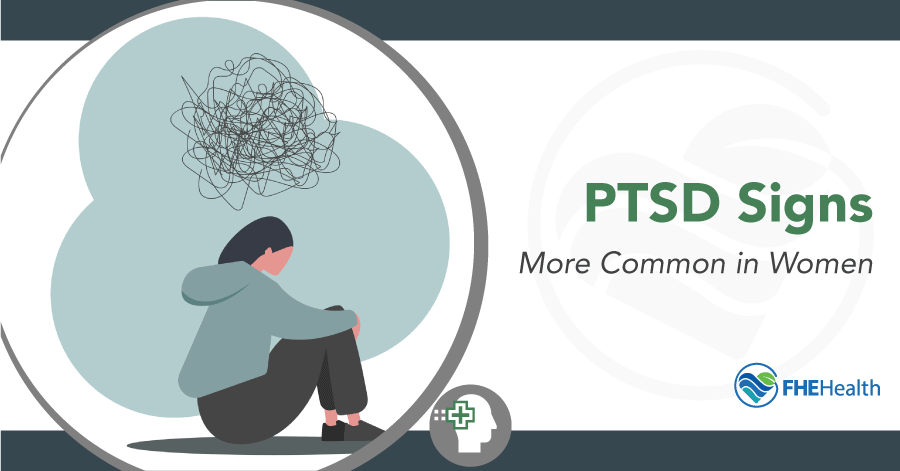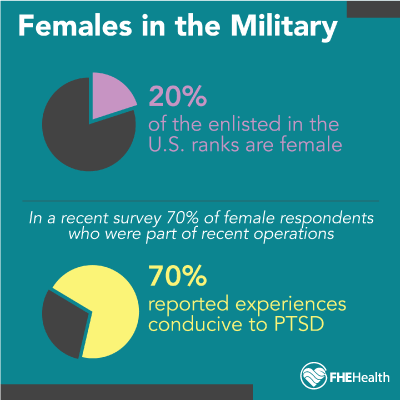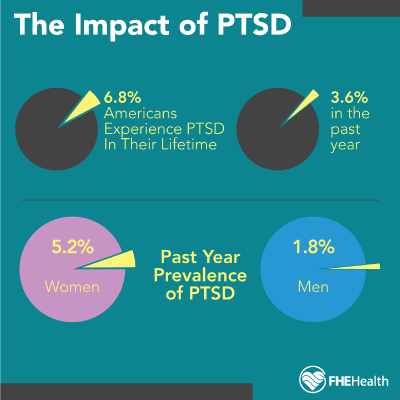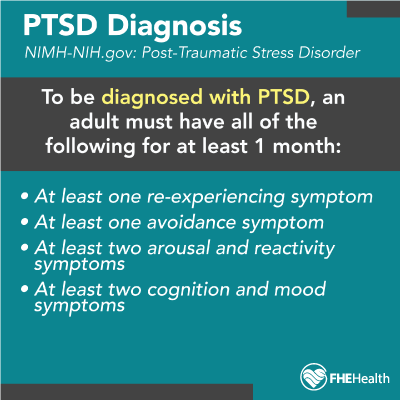
Updated April 9, 2025
Post-traumatic stress disorder, more commonly known as PTSD, impacts an estimated 6.8 percent of American adults over the course of their lifetime, with a notable prevalence of PTSD in women. According to the National Institute of Mental Health, approximately “3.6 percent of U.S. adults had PTSD in the past year,” and the vast majority of those suffering from the often debilitating effects of PTSD are women.
 Studies show that the past-year prevalence of PTSD in women in the United States was 5.2 percent and 1.8 percent for men, which means that the rates of PTSD in women are more than double what men experience.
Studies show that the past-year prevalence of PTSD in women in the United States was 5.2 percent and 1.8 percent for men, which means that the rates of PTSD in women are more than double what men experience.
With symptoms ranging from sleep disturbances to flashbacks, memory loss, and even suicidal thoughts, PTSD in women can lead to physical, emotional, and mental health issues such as obesity, drug addiction, severe anxiety, and difficulty with day-to-day activities.
Treatment can begin quickly and discreetly, get started now Researchers have also found that “the lifetime prevalence of PTSD is about 10-12 percent in women.” That means women have a greater than one-in-ten chance of developing PTSD at some point. According to the Anxiety and Depression Association of America, PTSD may be diagnosed once a person has experienced persistent symptoms for a minimum of one month following a traumatic event, such as a violent assault, car crash, rape, abuse, or another type of traumatic situation that is beyond his or her control. People can also be traumatized by a series of events that happen over time, such as an abusive childhood, ongoing domestic abuse, or while dealing with a life-threatening disease such as cancer. Currently, experts are unable to accurately predict which people will develop PTSD. In a recent survey of 185 female vets with PTSD who were part of either Operation Enduring Freedom (OEF), Operation Iraqi Freedom (OIF), or both, 70 percent of the respondents reported experiencing at least one violent combat experience involving direct fire, improvised explosive devices, or human remains. Another notable factor that explains why women veterans are at a much higher risk of developing PTSD than their male counterparts is gender-specific exposure to military sexual trauma or MST, which impacts an estimated one in five women vets. Research shows that female service members who have experienced MST (defined as any unwanted sexual contact or non-consensual activity) are a staggering five to eight times more likely to suffer from post-traumatic stress disorder in comparison to women in the service who have not experienced MST. Research into PTSD in women has been somewhat limited, and according to Dr. Miranda Olff, a professor at the University of Amsterdam Faculty of Medicine, “to date, we are still behind in gender and sex-sensitive research and reporting“. Experts believe that there are complex biological and psychosocial reasons why women develop PTSD more frequently than men. What is known is that women face a number of risk factors, including the increased likelihood that they will be sexually assaulted, that women have fewer financial resources compared to men (which leads to a lack of control), and that women are more likely to be victims of domestic abuse than men. Women also have a tendency to react emotionally to trauma, contributing to higher rates of PTSD in women compared to men, who are more inclined to display a fight-or-flight response. For example, a female may try to negotiate with an assailant, whereas a man may either respond with violence or simply flee the situation. Having post-traumatic stress disorder can make remembering details of the traumatic event difficult, which is often the case with women who are victims of a sexual assault. PTSD in women also leads to persistent, negative thoughts along with feelings of fear, anger, or shame. Treatment can begin quickly and discretely, get started now Women with PTSD may experience symptoms that men do not and vice versa. For instance, women who have PTSD may become more easily startled. They’re also at increased risk of feeling anxious and depressed. Another common symptom that women with PTSD experience is avoidance. Women are more likely to avoid any situations that remind them of their past trauma. In fact, there is some evidence that avoidance is among the most common PTSD symptoms that women experience. This avoidance might relate to people, places, or even things that remind them of their trauma. Unfortunately, avoidance can be helpful in the short term, but it can perpetuate an inability to cope with the condition and its symptoms. Avoidance can actually lead to a worsening of symptoms over time. Working through avoidance issues with a therapist is an important part of the PTSD recovery process for women. Women with PTSD are also at increased risk of experiencing emotional numbness. Shutting down emotions–good and bad–is sometimes the only way a person can “escape” the painful memories of traumatic experiences. In these cases, women with PTSD may no longer enjoy activities they used to enjoy. They may become more socially isolated and struggle to feel any emotions. To others, they seem detached and uninterested. Men with PTSD may also experience these symptoms, but they tend to be more pronounced in women with PTSD. Women are at greater risk of exposure to sexual trauma and violence than men. Domestic violence and sexual assault are more commonly faced by women. In the U.S., nearly 25 percent of women have experienced rape or attempted rape. More than 80 percent of women have experienced a form of sexual harassment, while 43 percent of men have. As a consequence, women are more likely to develop PTSD as a result of sexual assault than men. Women are also at increased risk to be raped by an intimate partner or to experience domestic violence. The trauma associated with sexual assault and violence may be simple or complex. Simple refers to a single traumatic event. Complex trauma refers to continued trauma such as domestic violence and repeated abuse. While coping strategies among women and men with PTSD can certainly overlap, women are more likely to cope with their symptoms by internalizing them, a common trait observed in PTSD in women. This can lead to the development of symptoms of depression and anxiety, which are more common in women with PTSD than men with the condition. Feelings of persistent hopelessness or perpetual worry can become debilitating when left untreated. Men who are suffering from PTSD, on the other hand, are more likely to engage in drug or alcohol abuse. They’re also more likely to exhibit poor impulse control. They may have more angry outbursts than women. It should be noted that women often cope in ways that are regarded as healthy coping mechanisms. For instance, they’re more likely to seek therapy and benefit from psychotherapy when it comes to PTSD. They’re also more likely to reach out socially to friends or family for support while trying to cope with their condition. Women who do not reach out socially are known to struggle more intensely with their condition. It’s common for both men and women with PTSD to seek out drugs and alcohol in an effort to manage their recurring thoughts, feelings, and physical symptoms. Unfortunately, attempts to self-medicate often lead to even more problematic issues such as an escalation in risk-taking behaviors, increased difficulty with memory and concentration, and negative interactions with law enforcement officials. The good news is that help is available. PTSD treatments for women are highly effective, accessible, and, in the hands of the right professionals, can provide lasting relief from the life-altering impacts of PTSD. The symptoms and signs of PTSD in women are more common than you might think, and left untreated, it can destroy your life. Here at FHE Health, we offer innovative, cutting-edge treatments for PTSD. If you notice that you or someone you care about is suffering from the signs of PTSD, call our team of compassionate professionals. We’re here for you 24 hours a day, 7 days a week. Ready to start? More questions about treatment? Chris Foy is a content manager and webmaster for FHE Health with years of experience in the addiction treatment industry...read moreNeed Help?
Recognizing Signs of PTSD in Women – It’s More Common Than You Might Think
Female Veterans and PTSD

What Causes High Rates of PTSD in Women?
Symptoms and Signs of PTSD in Women

Start Treatment Now
What Are Other Symptoms of PTSD That Women May Experience?
What Type of Trauma Are Women More Exposed To?
Are Coping Strategies in Women Different?
Seeing the Signs of PTSD? Don’t Try To Face PTSD Alone
Begin your recovery today
About Chris Foy
Footer






